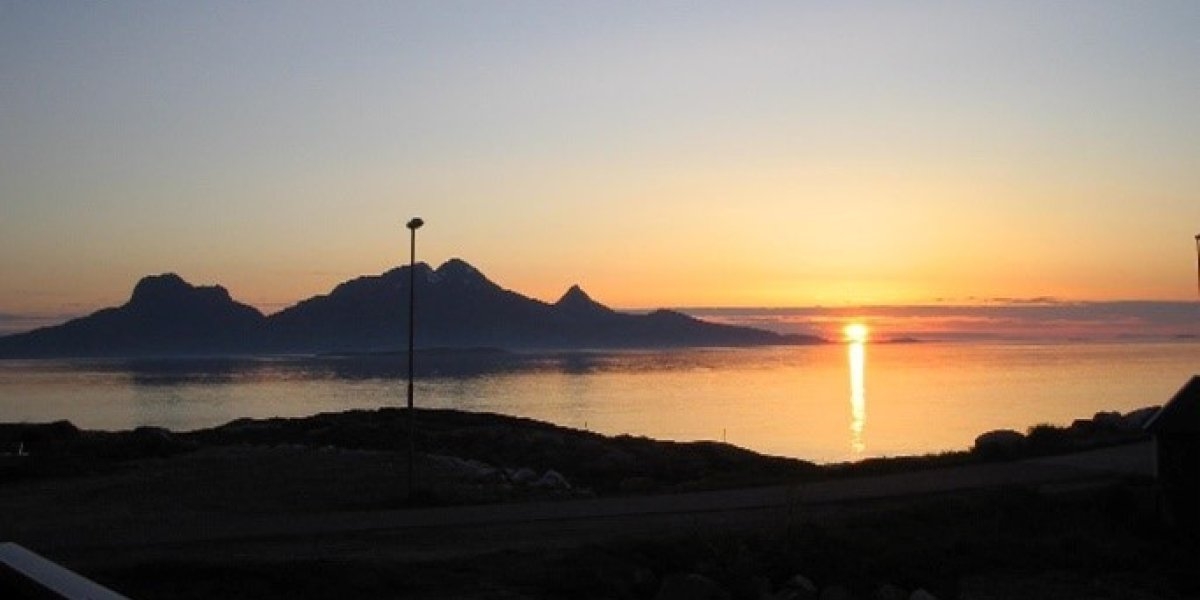The view from our family`s sea house in Skivika Bodø. Photo: Private
Do we deserve to see the sun?
Confessions from the northern parts of Norway
Tanja Ellingsen
This story is a part of the FLYWELL project. Read more of our stories here.
Growing up in the 1970s in the northern parts of Norway did not involve a lot of air-travel. For the most part our vacation consisted of traveling by ferry back to the place my grandparents once had a small farm. They had had to leave it behind to make ends meet and my granddad took upon a job in Sulithjelma Mines. As my mother was only 17 years old when she got me, we thus both lived together with them and my aunt in their new and more urban home in Fauske (60 kilometers from Bodø) in Nordland.
My grandmother and I, and some other people just arrived with the ferry at the breakwater in Rørstad, Sørfold . Photo: Private
Apart from these regular trips by ferry back to Rørstad where my grandparents once lived, my mother did over the years also take me with her on a few vacations to Sweden. I still remember the feeling of sitting in the back of her green Volkswagen crossing the border to Sweden at Graddis full-speed and my confusion of ice-cream being called “glas” in Swedish.
My first air-travel was thus not before I turned 14 years, and it was an air-travel together with my aunt to Lakselv in Finnmark, even further north.
As I was getting older, Interrail seemed to be the new thing – especially as the Berlin wall had been taken down, so in 1990 this was exactly what me and my boyfriend at that time did. Traveling by train from Bodø to Naples and back, of course including visits and stops in various European countries on the way.
The year after I moved to Trondheim to start my studies in history and later political science, but still air-travel was not so much on the table. Once the semester was done, me and a friend of mine, would take the night-train from Trondheim to Bodø to get home for Christmas. And usually, we were just sitting on the floor between wagons throughout the night as this was the cheapest way to get home. And many people did the same, so the floor was quite packed. An 11-hour train-ride between Trondheim and Bodø and visa versa.
It was not until later into my studies, and after finishing my studies, that air-travel really took off. As I was doing my master studies (in Trondheim) and later Ph.D (at UiO) I suddenly was traveling to various conferences such as IPSA or ISA to present papers and build an international network. I also went to study a year abroad at the University of Maryland, College Park as part of my Ph.D.
Air-travel became a regular part of my academic life, but also more common in general. Then fast forward 10-15 years later and a stranded relationship I found myself raising three children on my own, and it became more difficult to keep doing all the traveling, especially as I did not have any family to support me in Oslo or Trondheim. So in 2016 I decided to move back to Bodø and the northern parts of Norway and started a job at Nord university.
Me (Tanja, 4 years old) in the woods behind my grandparents small farm in Rørstad, Sørfold
Living in this part of the country, there are three things that one immediately realizes:
1. That travelling abroad – both by plane and by train – is rather expensive.
2. That Nordlandsbanen is not in the best shape.
3. It means a long extra commute – whether we are talking by train or even by plane.
In sum this has meant that I have tried to keep traveling to a minimum, and luckily, I do not have to teach at different campuses as some people at Nord university do. Given that we have campuses stretching from Stjørdal in Trøndelag to Stokmarknes in Lofoten (a 858 km long distance), this is quite a challenge. I still go to conferences and travel for research, but not very often, but when I do, I must confess that it is usually by plane.
Becoming involved in the FLYWELL-project and interviewing academics about their air-travel practices have of course made me reflect more on my own air-travel practice, and also about life and practices within academia more generally, as well as about living in more remote areas of Norway in particular.
Currently academics are expected to travel to be successful in their career. However, the empirical support for this notion is yet limited. It is one of the many things we really do not know for sure. When asking academics about their air-travel practice they do talk about it as being very important for their career though, but also that it is taking a toll on family-life and the work-life balance. On the other hand, it also brings adventure, seeing new places and getting to know interesting people with similar interests.
Corona seems to have had an impact in terms of making it more acceptable to not always be there physically, at least for certain things, yet few expects the practices to change unless expectations of “what being an academic entails” changes. Here universities have a huge responsibility.
Currently, at the individual level, for academics at Nord, some would even argue that because we live so far up north, with cold and dark winters, we also deserve to see the sun!
I wonder.., as I think about last year’s wildfires in Europe, and stare into tonight’s midnight-sun. It has been one of those too rare, but amazing summer day’s here in the north.
